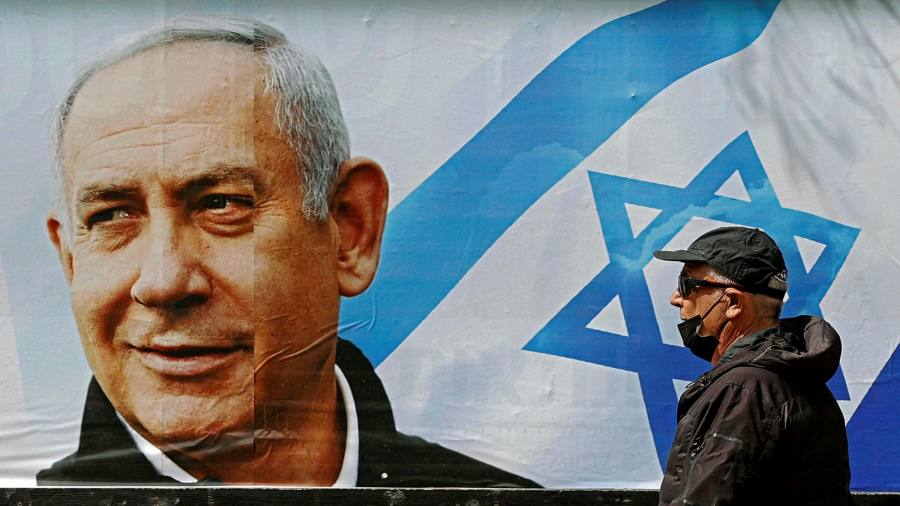[ad_1]
Just days after Israel ended its lockdown, kicking off a massive party for millions of vaccinated Israelis, Benjamin Netanyahu unfurled a new re-election campaign poster.
“Back to life!†the five-time premier declared, raising both thumbs to the sky as he stood amid falling confetti, mirroring the ebullient national mood.
Facing his fourth election in two years next week, Israel’s longest serving prime minister hopes his success in spearheading the world’s fastest vaccination campaign will bring his political fortunes back to life and break the stalemate at the polls.
“His endless efforts to get the vaccines to Israel were driven by the thought that if he gets enough vaccines, he will be rewarded in the elections,†said Roni Rimon, a veteran political strategist who ran Netanyahu’s 2009 election campaign. “And that if he fails, he will be punished.â€
Netanyahu’s political future is threatened not just by an ongoing corruption trial but by erstwhile allies seeking to wrest his throne from him. Indicted last year for bribery, fraud and breach of trust, he has dismissed the charges as politically motivated.
Having secured an agreement with Pfizer by mid-December, which gave Israel rapid, unlimited supplies of the BioNTech/Pfizer vaccine, Netanyahu pulled the plug on his shortlived coalition government just after Christmas. Had the government continued, he would have had to relinquish the premiership to his defence minister, Benny Gantz as part of a rotating agreement.
By January, as the inoculation drive got under way, Netanyahu was in full-on re-election mode, driving from vaccination site to vaccination site, promising that Israel would be the first nation to tame the pandemic.
A week-and-a-half ago, he delivered on that promise — with 4.3m out of some 7m adults fully inoculated, and another million awaiting their second shot, Israel’s economy is now fully reopened. And as other larger, wealthier nations still struggle to secure supplies, Israel is awash in more vaccines from rival manufacturers than it will ever use, its excess stores being deployed as humanitarian aid.
The polls are divided on whether Netanyahu’s strategy has worked. In January, when the vaccination campaign started, polls suggested his Likud party would win 40 seats in the 120-seat Knesset. Now, as the country is caught up in a giddy post-pandemic celebration, that has drifted to about 30 seats — a harbinger of more political gridlock to come.
Pollsters attribute the decline to Netanyahu’s embrace of two ultraorthodox parties as prospective coalition partners, even as Israelis seethed at the minority community for ignoring lockdowns, and to the appeal of his rightwing challengers.
If Netanyahu and his coalition allies do not secure enough seats to coax smaller parties to help them reach the 61-seat mark, opposition leaders — including the centre-left former TV anchor Yair Lapid and erstwhile Likud leader Gideon Sa’ar — will try to entice them to form a governing coalition instead.
Meanwhile, voters can choose between three camps — those who want Netanyahu to be the next prime minister, those who have vowed to dethrone him, and those who are awaiting the chance to be kingmakers in the fractious post-election coalition building that usually takes months to resolve itself.
These political tribes had proved resistant to Netanyahu’s vaccine success, said Dahlia Scheindlin, a veteran pollster who has advised several Israeli and international politicians, and are measuring him with a wider lens.
“Ultimately it seems the vast majority of voters are filtering Covid, Netanyahu’s heath and economic management and even the vaccines through the filter they had already generated before the first case hit Israel,†she said. “It’s not only a cult of personality but there are real achievements or failings, respectively, that motivate each side.â€
In the heated last week of the election campaign, Covid dominates the headlines. Netanyahu has struggled to expand his campaign beyond the pandemic — a planned trip to the UAE to burnish his foreign policy credentials was scrapped over a spat with Jordan over flight routes.
Without a friendly US administration to deliver the pre-election boosts that Donald Trump provided the last three times Israelis went to the polls — such as promising to label exports from the illegal settlements as Made in Israel, Netanyahu has little to campaign on when it comes to the Palestinian issue.
“So the only saving grace is the vaccine issue, and he killed himself trying to get the vaccines here,†said Rimon, the strategist. “To call the CEO of Pfizer a trillion times, I am sure no prime minister in the world would do it.â€
Rimon hazards a cautious guess that it may have worked — by the time Israelis get to the polls on Tuesday, he says, it will sink in that the pandemic in their tiny country has ended far before anywhere else. Rightwing voters, especially, who suddenly have two other major candidates, could swing back to Netanyahu.
Sarah Rosler, an 82-year old grandmother from Jerusalem, is convinced. She is unimpressed with the other rightwing candidates, one a breakaway from Likud who has vowed to unseat Netanyahu, and the other a spurned ex-ally who refuses to say what his position will be until the polls are over.
“I don’t see a big difference between them,†she said. “The only thing that distinguishes one party from the other is whether they are pro or anti Netanyahu.â€
In the end, she “will definitely vote for Netanyahu — he amazed me when he bought the millions of Pfizer and Moderna vaccines, before any of the other countries did. It was in a way a gambleâ€.
[ad_2]
Source link







